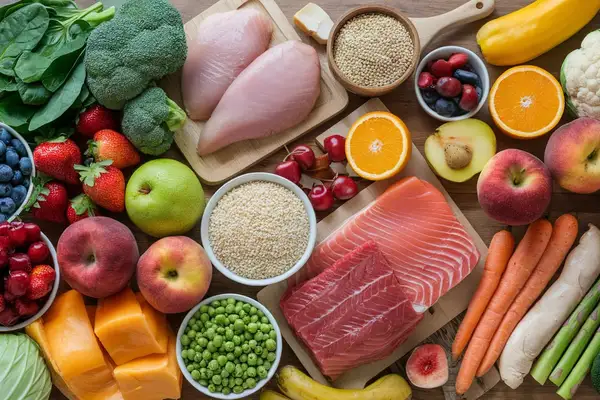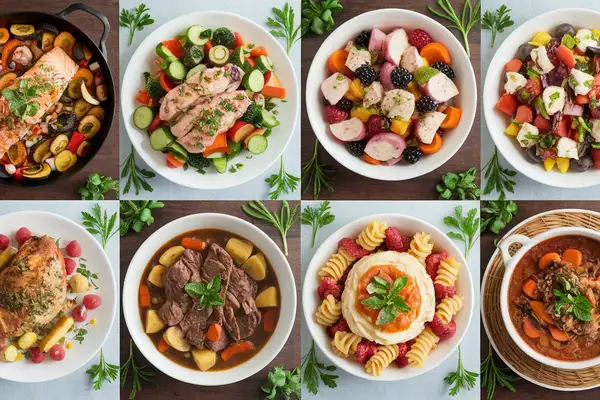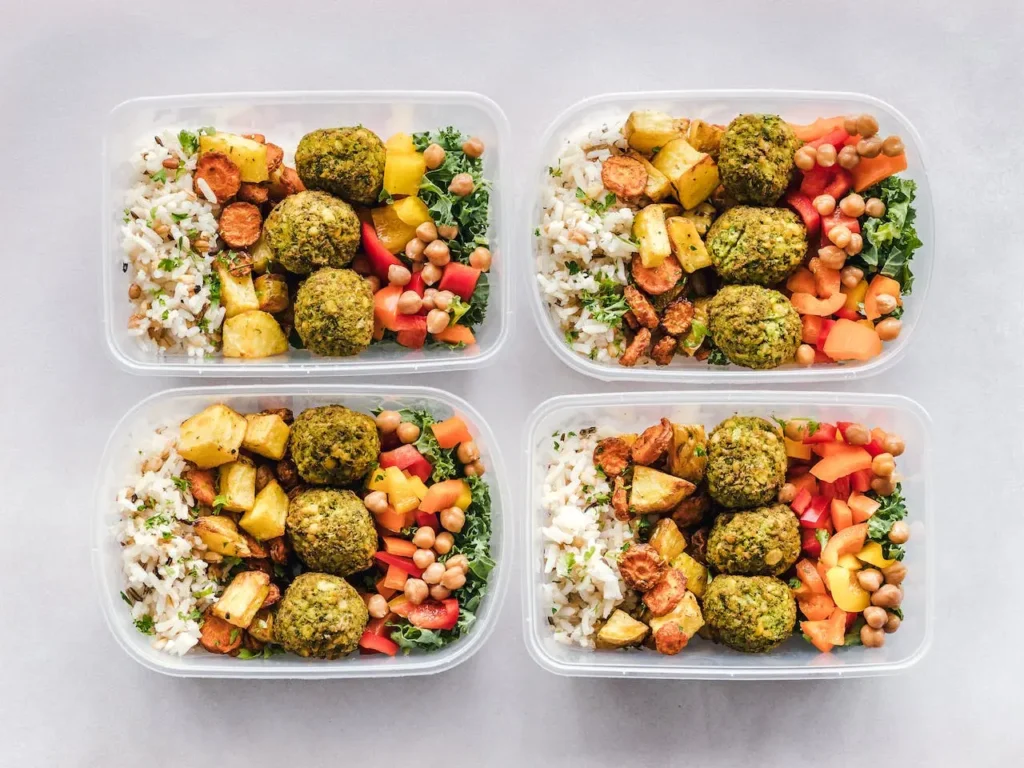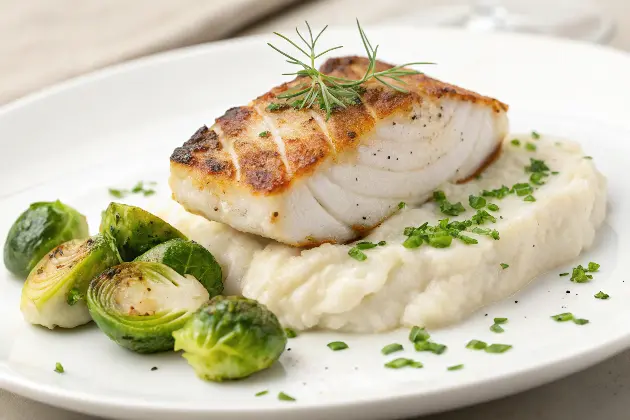7-Day Carb Cycling Meal Plan | Boost Energy and Burn Fat
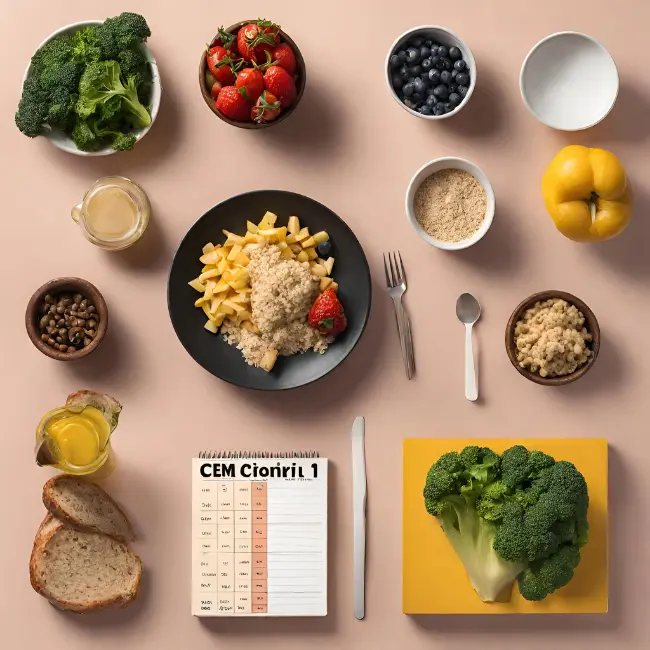
What is a Carb Cycling Meal Plan?
This post may contain affiliate links, meaning I may earn a commission if you make a purchase, at no extra cost to you. I only recommend products I trust. Thank you for your support.
A carb cycling meal plan is a structured nutritional approach that alternates between high and low carbohydrate intake on different days of the week.
This method is often utilized by athletes, bodybuilders, and fitness enthusiasts to optimize performance, promote muscle growth, and manage body composition.
By strategically timing high and low carb days based on activity levels and training intensity, individuals can harness the benefits of carbohydrates for energy while also effectively managing fat metabolism.
The carb cycling meal plan offers flexibility and customization, making it a popular choice for those seeking to achieve specific fitness and nutrition goals.
Whether aiming to improve athletic performance, enhance body composition, or support overall health, a well designed carb cycling meal plan can provide the framework for balanced and targeted nutrition.
In this 7-day carb cycling meal plan, we will guide you through the process of creating a balanced and delicious meal plan that will help you achieve your health and fitness goals.
How Does Carb Cycling Work?
Carb cycling works by manipulating your carbohydrate intake to influence insulin levels, promote fat burning, and optimize performance.
Here’s how it works:
- On high-carb days, you consume a higher amount of carbohydrates to replenish glycogen stores and provide energy for intense workouts. This stimulates the release of insulin, which helps shuttle nutrients into muscle cells, promoting muscle growth.
- On low-carb days, you reduce your carbohydrate intake to promote fat burning and increase insulin sensitivity. With lower insulin levels, your body switches to using stored fat as fuel, leading to fat loss.
By alternating between these high-carb and low-carb days, you can maximize the benefits of both fat burning and muscle growth.
7-Day Carb Cycling Plan for Beginners
Now that you understand the principles of carb cycling, let’s dive into creating a 7-day carb cycling plan that will help you achieve your goals.
Creating a carb cycling meal plan involves alternating the amount of carbohydrates you consume on a daily or weekly basis to support your fitness and health goals.
Here’s a breakdown of each day’s meal plan:
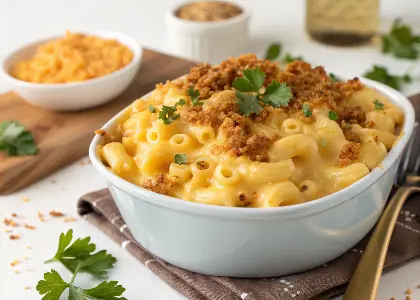
Day 1: High Carb Day
Breakfast:
- Scrambled eggs with vegetables and avocado: Scramble eggs with mixed vegetables and serve with sliced avocado. (2 whole eggs, 1 cup spinach, bell peppers, and onions, ¼ avocado)
Lunch:
- Vegetable Fried Rice: Sauté mixed veggies in oil; add day‑old rice & soy sauce; scramble an egg in the pan; toss together. (2 cups cooked rice, 1 cup mixed veggies, 1 egg, 1 tbsp oil, 2 tbsp soy sauce)
Dinner:
- Creamy Mac & Cheese: Cook macaroni until al dente; make a roux with butter & flour, whisk in milk & cheese; combine. (2 cups elbow macaroni, 2 tbsp butter, 2 tbsp flour, 1 cup milk, 1½ cups shredded cheddar)
Snacks:
- Greek yogurt with berries: Combine plain Greek yogurt with mixed berries. (1 cup plain Greek yogurt, ½ cup strawberries, blueberries, and raspberries)
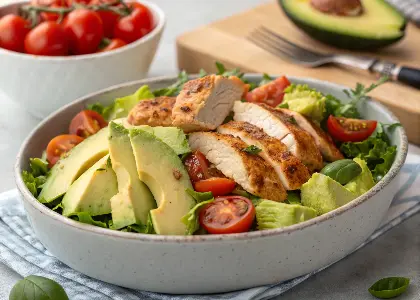
Day 2: Low Carb Day
Breakfast:
- Oatmeal with almond butter and banana slices: Cook oats in water and top with almond butter and banana slices. (½ cup rolled oats, 1 cup water, 1 tbsp almond butter, ½ banana sliced)
Lunch:
- Grilled chicken salad with balsamic vinaigrette: Grill chicken breast and serve on a bed of greens with cherry tomatoes, cucumber, and balsamic vinaigrette. (4 oz grilled chicken, 2 cups mixed greens, ¼ cup cherry tomatoes, ¼ cup cucumber slices, 2 tbsp balsamic vinaigrette)
Dinner:
- Steak with Garlic Butter & Asparagus: Pan‑sear steak, top with garlic‑herb butter; roast asparagus alongside. (6 oz sirloin, 1 tbsp butter, 1 clove garlic, 1 cup asparagus)
Snacks:
- Carrot sticks with hummus: Dip fresh carrot sticks in creamy hummus. (1 cup carrot sticks, 2 tbsp hummus)

Day 3: High Carb Day
Breakfast:
- Protein pancakes with berries and almond butter: Blend protein powder, eggs, and almond milk into a batter, cook into pancakes, and top with berries and almond butter. (2 scoops protein powder, 2 eggs, ¼ cup almond milk, ½ cup mixed berries, 1 tbsp almond butter)
Lunch:
- Loaded Baked Potato with Chili: Bake potato until tender; split and fluff with fork; top with bean chili and shredded cheese. (1 large russet potato, ½ cup chili (beans & tomato), ¼ cup shredded cheddar)
Dinner:
- Pad Thai: Stir‑fry rice noodles with shrimp, tofu, egg & bean sprouts; finish with tamarind sauce & crushed peanuts. (6 oz rice noodles, 4 oz shrimp, 2 oz tofu, 1 egg, ½ cup bean sprouts, 2 tbsp tamarind sauce)
Snacks:
- Protein shake with almond milk: Blend protein powder with almond milk for a quick shake. (1 scoop protein powder, 1 cup almond milk)
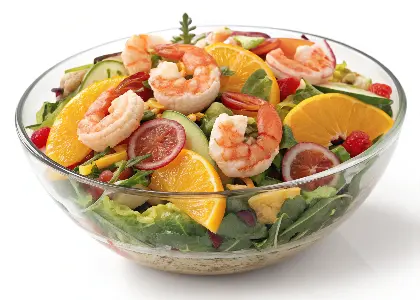
Day 4: Low Carb Day
Breakfast:
- Veggie omelet with whole wheat toast: Cook an omelet with eggs and diced vegetables, served with a slice of whole wheat toast. (2 whole eggs, ¼ cup diced mushrooms, onions, and peppers, 1 slice whole wheat toast)
Lunch:
- Tuna salad lettuce wraps with carrot sticks: Mix tuna with Greek yogurt and celery, then serve in lettuce leaves with a side of carrot sticks. (1 can tuna, 1 tbsp Greek yogurt, ¼ cup diced celery, lettuce leaves for wrapping, 1 cup carrot sticks)
Dinner:
- Citrus shrimp salad: Toss shrimp with mixed greens, orange segments, and a light citrus vinaigrette. (4 oz shrimp, 2 cups mixed greens, ½ orange sliced, 1 tbsp citrus vinaigrette)
Snacks:
- Hard-boiled eggs: Simple and protein-packed snack. (2 hard-boiled eggs)

Day 5: High Carb Day
Breakfast:
- Avocado toast with smoked salmon: Top whole wheat toast with mashed avocado and smoked salmon. (1 slice whole wheat toast, ¼ avocado mashed, 2 oz smoked salmon)
Lunch:
- Penne Alfredo: Cook penne until al dente; stir in a sauce of butter, cream & Parmesan until smooth. (8 oz penne, 2 tbsp butter, ¼ cup heavy cream, ¼ cup grated Parmesan)
Dinner:
- Margherita Pizza: Top pizza dough with tomato sauce, fresh mozzarella & basil; bake until crust is golden. (1 small pizza dough, ½ cup tomato sauce, 4 oz mozzarella, 6 basil leaves)
Snacks:
- Mixed nuts: A nutrient-dense snack of almonds, walnuts, and cashews. (¼ cup mixed nuts; almonds, walnuts, cashews)
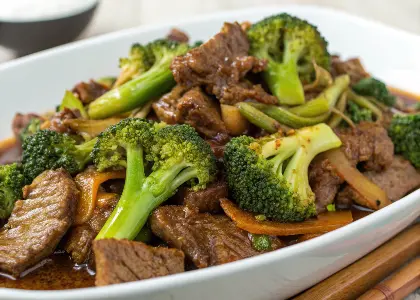
Day 6: Low Carb Day
Breakfast:
- Greek yogurt with granola and mixed berries: Top Greek yogurt with granola and fresh mixed berries. (1 cup plain Greek yogurt, ¼ cup granola, ½ cup mixed berries)
Lunch:
- Tofu Stir‑Fry with Bok Choy & Mushrooms: Sauté tofu cubes with bok choy, shiitakes, garlic & tamari. (4 oz firm tofu, 1 cup bok choy, ½ cup mushrooms, 1 tbsp tamari)
Dinner:
- Lean beef stir fry: Sauté lean beef strips with a mix of colorful vegetables in a light soy or sesame sauce. (4 oz lean beef strips, 1 cup mixed stir-fry vegetables; bell peppers, broccoli, snap peas, 1 tsp sesame oil or light soy sauce)
Snacks:
- Protein smoothie with spinach and almond milk: Blend protein powder with spinach, almond milk, and banana. (1 scoop protein powder, 1 cup spinach, 1 cup almond milk, ½ banana)

Day 7: High Carb Day
Breakfast:
- Egg white omelet with spinach and feta cheese: Cook egg whites in a skillet with sautéed spinach and crumbled feta. (4 egg whites, 1 cup spinach, ¼ cup crumbled feta cheese)
Lunch:
- Spaghetti Bolognese: Brown ground beef with onion & garlic, add tomato sauce & simmer; toss with spaghetti. (8 oz spaghetti, 6 oz ground beef, ½ cup tomato sauce, ¼ cup diced onion, 1 clove garlic)
Dinner:
- Vegetable Risotto: Sauté arborio rice with onion, deglaze with white wine, gradually stir in broth & mixed veggies until creamy. (1 cup arborio rice, ½ cup mixed veggies, 1 tbsp olive oil, ¼ cup white wine, 2 cups broth)
Snacks:
- Cottage cheese with sliced peaches: Light and creamy cottage cheese topped with sweet peach slices. (½ cup cottage cheese, ½ cup sliced peaches)
High Carb Foods List
Focus on foods that provide actual carbohydrates. Here is a list of high carb foods:
1. Complex Carbohydrates
- Brown rice
- Quinoa
- Oats
- Sweet potatoes
- Whole grain pasta
- Barley
- Lentils
- Chickpeas
- Black beans
- Kidney beans
- Couscous
- Whole wheat bread
- Ezekiel bread
- Bulgur
- Farro
- Cornmeal (polenta)
- Millet
- Buckwheat
- Wild rice
- Amaranth
2. High Carb Fruits
- Bananas
- Mangoes
- Grapes
- Cherries
- Pineapple
- Apples
- Pears
- Watermelon
- Figs
- Dates
- Lychee
- Persimmons
3. Starchy Vegetables
- Peas
- Carrots
- Beets
- Butternut squash
- Pumpkin
- Sweet corn
4. High Carb Dairy & Dairy Alternatives
- Flavored yogurt
- Sweetened plant-based milks (almond, soy, oat)
- Milk (especially low-fat or skim)
- Kefir
- Condensed milk
5. Natural & Unrefined Sugars (Use Sparingly)
- Honey
- Maple syrup
- Coconut sugar
- Molasses
- Agave nectar
6. Grain-Based Snacks & Baked Goods
- Granola (low sugar)
- Whole grain crackers
- Popcorn (air-popped)
- Whole wheat tortillas
- Brown rice cakes
- Bran muffins
Low Carb Foods List
There are mostly high protein, high fat, very low carb, under 50g carbs/day total. Here is a list of low carb foods:
1. Non-Starchy Vegetables (very low carb)
- Spinach
- Kale
- Arugula
- Broccoli
- Cauliflower
- Zucchini
- Cucumber
- Mushrooms
- Bell peppers
- Asparagus
- Celery
- Cabbage
- Green beans
2. Lean Proteins
- Chicken breast
- Turkey
- Salmon (rich in omega-3s)
- Sardines
- Tuna
- Eggs
- Ground beef (85–90% lean)
- Pork loin or chops
- Shellfish (shrimp, scallops)
3. Healthy Fats
- Olive oil
- Avocado
- Coconut oil
- Ghee
- MCT oil
- Fish oil
- Nuts (almonds, pecans, macadamia – in moderation)
- Seeds (chia, flax, sunflower, pumpkin – in moderation)
- Nut butters (natural, sugar-free)
4. Low Carb Dairy
- Full-fat Greek yogurt (plain)
- Cottage cheese
- Hard cheeses (cheddar, parmesan, gouda)
- Cream cheese (in moderation)
- Heavy cream
5. Low Carb Fruits
- Avocados
- Olives
- Tomatoes
- Blackberries
- Raspberries
- Strawberries
- Lemons
- Limes
- Coconut (unsweetened)
- Rhubarb
- Cranberries (fresh, unsweetened)
- Blueberries (in moderation)
6. Additional Protein & Fat Sources
- Protein powder (whey or plant-based with no added sugar)
- Edamame
- Tofu
- Tempeh
- Bone broth
- Low-carb protein bars (check labels carefully)
Benefits of a Carb Cycling Meal Plan
A carb cycling meal plan offers a range of benefits depending on your fitness goals, metabolic needs, and lifestyle.
Here’s a detailed look at why carb cycling can be an effective strategy:
1. Supports Fat Loss & Weight Management
- Fat Burning on Low-Carb Days: On low-carb days, your body uses fat as the primary energy source, promoting fat loss. This leads to improved fat-burning without risking muscle loss.
- Increased Metabolic Rate on High-Carb Days: Carb cycling boosts metabolism during high-carb days, helping maintain or even increase energy expenditure, which supports weight loss or maintenance.
- Prevents Adaptation: The variety of carb intake keeps the body from adapting to a constant low-carb diet, a common challenge for people trying to lose weight on a standard low-carb regimen.
2. Preserves Muscle Mass
- Muscle Sparing on High-Carb Days: High-carb days provide the body with essential glycogen stores to fuel workouts, particularly strength training and high-intensity exercises, ensuring you don’t lose muscle while on a calorie deficit.
- Helps Maintain Performance: By ensuring adequate carb intake, especially on workout days, carb cycling supports muscle recovery and enhances workout performance, preventing fatigue or low energy during training.
3. Improves Insulin Sensitivity
- Better Blood Sugar Control: On low-carb days, insulin sensitivity improves, helping manage blood sugar levels. This is especially beneficial for individuals with insulin resistance or those aiming to stabilize glucose levels.
- Carb Cycling Can Help With Type 2 Diabetes: By alternating between low and high-carb days, carb cycling may improve the body’s ability to utilize carbohydrates more efficiently, contributing to long-term blood sugar control.
4. Boosts Energy Levels and Performance
- Carb-Loading for Performance: On high-carb days, your muscles replenish glycogen stores, providing more energy for intense physical activities like weightlifting, running, or HIIT (high-intensity interval training).
- Improved Exercise Capacity: Carb cycling ensures that on high-carb days, you have sufficient energy for optimal performance without feeling sluggish, which can be common when following a strict low-carb or keto diet.
5. Supports Mental Clarity and Focus
- Brain Fuel on High-Carb Days: Carbohydrates are the primary fuel source for the brain. High-carb days improve cognitive functions, memory, and focus, helping you stay sharp during mentally demanding tasks.
- Improved Mood: Avoiding sustained low-carb diets helps prevent symptoms of brain fog, irritability, and fatigue that can sometimes occur with low-carb regimens. The balance of carbs helps maintain a healthy balance of serotonin, promoting a better mood.
6. Flexibility and Variety
- Psychological Satisfaction: Carb cycling provides flexibility. You don’t have to restrict carbs completely, making it easier to stick to your meal plan long-term. You get to enjoy carb-rich foods on high-carb days without the guilt.
- Variety in Meals: The alternating high and low-carb days allow for a wider range of meal choices, helping prevent diet fatigue. Plus, it adds an element of freedom that makes it easier to stick to healthier eating habits.
7. Improves Hormonal Health
- Preserves Thyroid Function: Long-term low-carb diets may lower thyroid hormone levels, which can negatively impact metabolism. Carb cycling helps maintain thyroid function, promoting metabolic health.
- Supports Reproductive Health: Maintaining a balance of carbs ensures that hormones like leptin and cortisol stay balanced. This is important for fertility, ovarian health, and overall hormonal regulation.
8. Enhances Fat Loss Without Extreme Restriction
- No Constant Caloric Deficit: Unlike traditional calorie restriction, carb cycling can promote fat loss while allowing you to eat more on high-carb days. This prevents feelings of deprivation and helps improve adherence to a meal plan long-term.
- More Sustainable: Carb cycling helps create a more sustainable balance between fat loss and muscle gain. It ensures you don’t experience the metabolic slowdown often associated with prolonged low-carb diets.
9. Customizable for Different Fitness Goals
- Bodybuilders & Athletes: Carb cycling is often favored by athletes and bodybuilders as it helps build muscle while promoting fat loss, particularly around peak performance times, like during competitions or specific training phases.
- General Fitness Enthusiasts: For individuals looking to improve body composition, carb cycling allows flexibility, making it easier to stay on track with fitness goals without worrying about constant strict dieting.
10. Prevents Plateaus
- Avoids Metabolic Adaptation: By cycling between high and low carb days, you can prevent your metabolism from adapting to a single eating pattern, avoiding weight loss plateaus and making progress toward goals easier.
Resources
Here are some relevant insights on research studies about carb cycling meal plans.
1. Efficacy of Carb Cycling Plan for Weight Loss
A preliminary study involving overweight and sedentary women showed that short-term diet cycling during a weight loss and exercise program may promote weight loss without associated reductions in REE.
Leslie Bonci, MPH, RDN, CSSD, LDN, owner of Active Eating Advice by Leslie, highlights that some athletes train less and limit their carbohydrate intake.
Carb cycling may be beneficial for certain health and fitness goals, such as helping people lose weight, improve sporting performance, and increase insulin sensitivity.
Conclusion
A carb cycling meal plan can be a powerful tool for boosting energy, burning fat, and building lean muscle.
A 7-day carb cycling meal plan can be a structured approach to managing carbohydrate intake to potentially achieve specific health and fitness goals.
By strategically alternating between high-carb, low-carb, and possibly no-carb days, individuals may aim to regulate insulin levels, support energy needs for workouts, and potentially enhance fat metabolism.
However, it’s crucial to customize the carb cycling meal plan according to individual needs and activity levels.
Seek guidance from a qualified nutrition professional to ensure that nutritional requirements are met across the cycle.
With the 7-day carb cycling plan and the tips provided, you have the tools to embark on your carb cycling journey and achieve your health and fitness goals.
Consistency, patience, and attentiveness to the body’s response to the varying carbohydrate intake are essential components for the successful implementation of a carb cycling meal plan.
Trending articles on weight management and health improvement:
- Intermittent meal plan for beginners
- 1400 calorie diet for weight loss
- 40 Mediterranean diet breakfast ideas
- Delicious recipes for the Daniel Fast meal plan
- 7 day Daniel Fast meal plan
- 30 day low FODMAP meal plan
- Ice hack for weight loss
- South beach diet for weight loss
- 21 day Fatty liver meal plan
- Low FODMAP snack ideas
- 7 day meal plan for gestational diabetes
- 7 day meal plan for ulcerative colitis
- Endomorph Carb Cycling Meal Plan
Frequently Asked Questions (FAQs)
What is a carb cycling meal plan?
A carb cycling meal plan is a dietary approach that alternates carbohydrate intake on a daily, weekly, or monthly basis.
It involves rotating between high-carb days, low-carb days, and sometimes no-carb days to achieve specific health or fitness goals.
Is carb cycling suitable for everyone?
Carb cycling may not be suitable for everyone, especially those with certain medical conditions or specific dietary needs.
It’s essential to consult with a healthcare professional or a registered dietitian before starting a carb cycling meal plan.
What foods can I eat on a carb cycling meal plan?
High-carb days typically include foods such as whole grains, fruits, and starchy vegetables.
On low-carb days, individuals may consume lean proteins, non-starchy vegetables, and healthy fats. No-carb days often focus on proteins, fats, and non-starchy vegetables.
How should I structure a carb cycling meal plan?
The structure of a carb cycling meal plan depends on individual goals, activity levels, and overall health.
It’s important to tailor the plan to meet specific needs and consider seeking guidance from a qualified nutrition professional.
Are there any risks associated with carb cycling?
Potential risks of carb cycling include nutrient deficiencies if not properly planned, potential negative effects on exercise performance during low-carb days, and the challenges of adhering to a cyclical dietary pattern.
How long should I use the carb cycling meal plan to see results?
The duration for seeing results from carb cycling can vary among individuals. It’s important to be patient and consistent with the approach while monitoring how the body responds to the changes in carbohydrate intake.
Can a carb cycling meal plan help with muscle building?
A carb cycling meal plan may be utilized to support muscle building by strategically timing high-carb intake around intense workout sessions to provide energy for training and optimize muscle recovery.
Citations
Kresta JY, Byrd M, Oliver JM, Canon C, Mardock M, Simbo S, Jung Y, Koozehchian M, Khanna D, Lockard B, Dalton R, Kim HK, Rasmussen C, Kreider RB. Effects of diet cycling on weight loss, fat loss and resting energy expenditure in women. J Int Soc Sports Nutr. 2010 Sep 15;7(Suppl 1):P21. doi: 10.1186/1550-2783-7-S1-P21. PMCID: PMC2951044.
